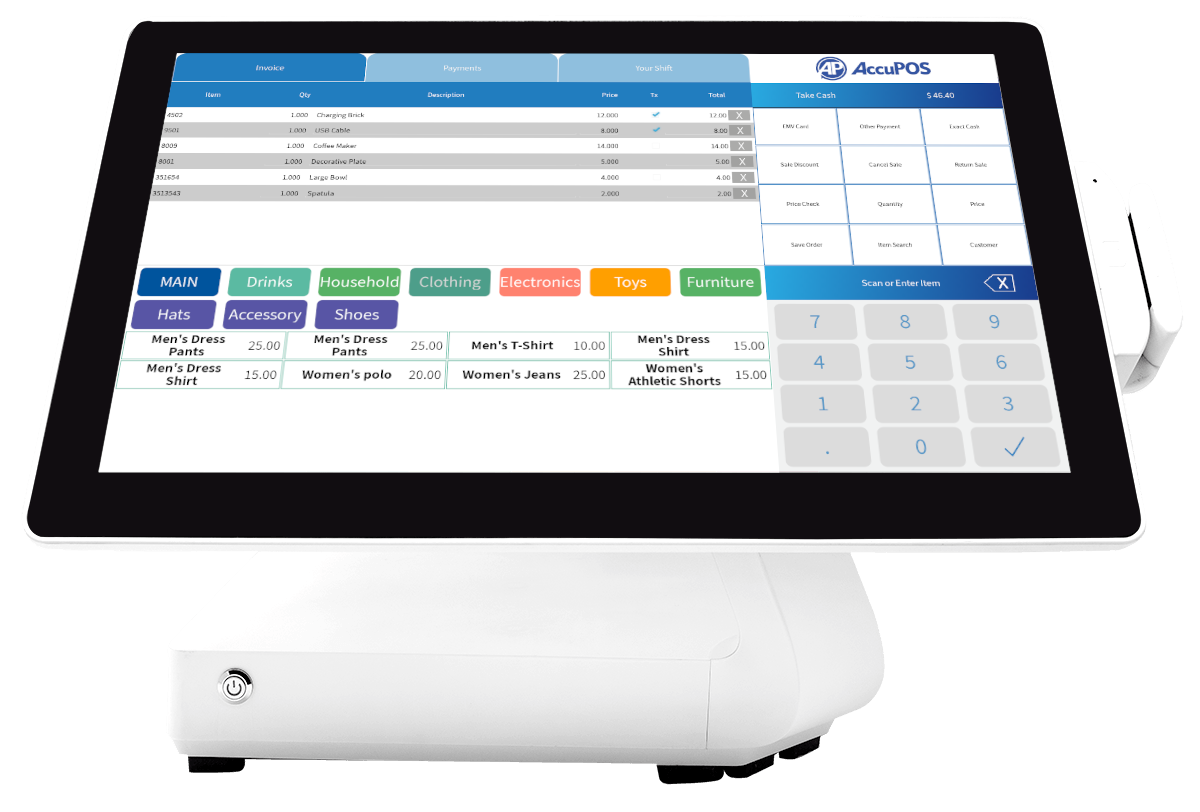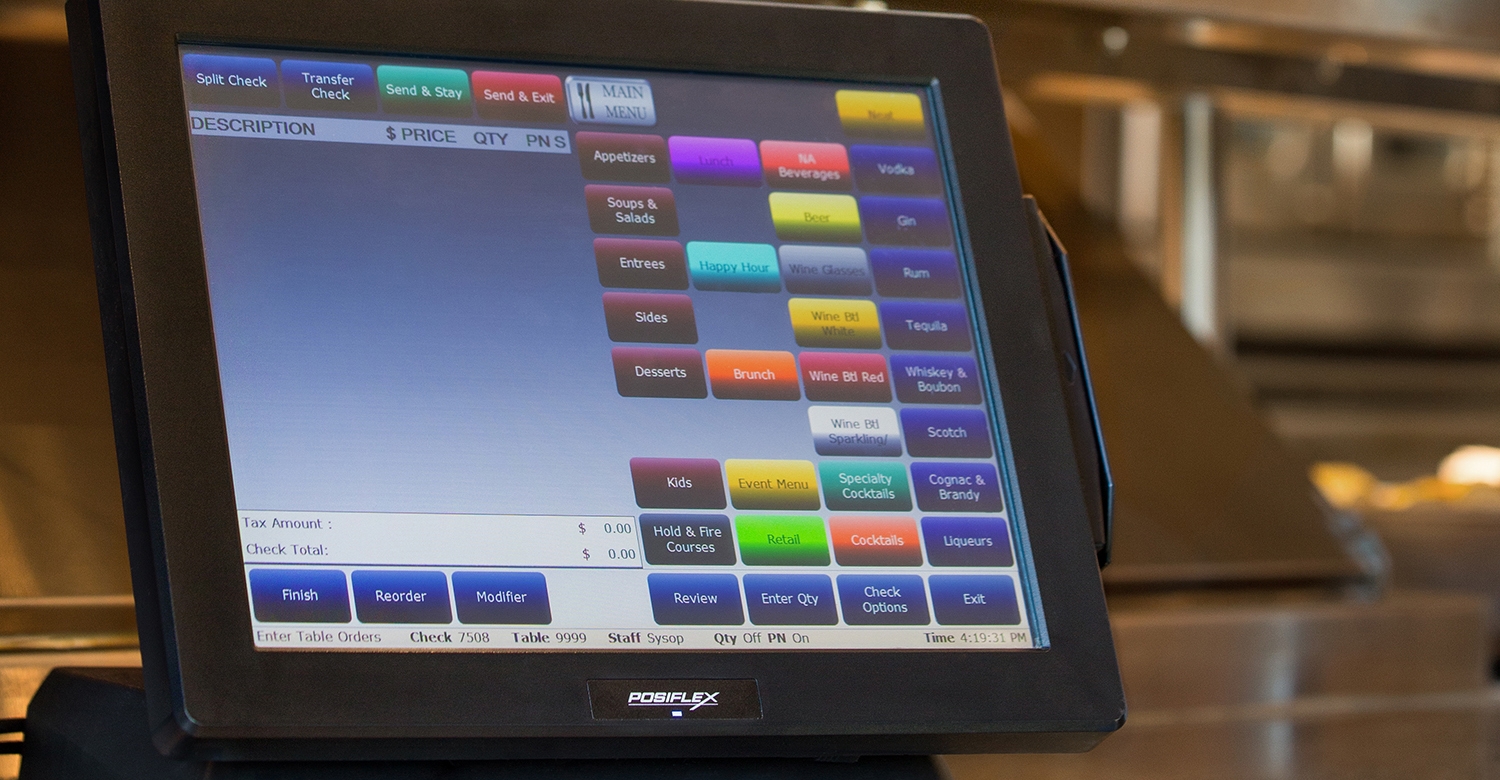What Does Restaurant Pos Do?
What Does Restaurant Pos Do?
Blog Article
The Definitive Guide to Pos Systems

POS Machine: Retail Point-Of-Sale Solutions Streamline Transactions
The 10-Second Trick For Pos Systems

Hardware Components of a Point of Sale System What makes a POS system tick? It's not just software application; the hardware plays a starring role. Consider it as the body to the software's brain. Without the ideal hardware, even the most sophisticated POS software application is just a quite face. Vital POS Hardware So, what are the must-haves? Let's simplify. The main processing unit, often a computer or tablet, is the heart of the operation. The monitor or touchscreen display permits personnel to connect with the system. A barcode scanner accelerate the checkout procedure. Keep in mind the days of by hand entering each code? The trusty receipt printer provides consumers with a record of their purchase. A cash drawer keeps your cash safe and organized. A card reader permits clients to pay with credit or debit cards. Diving Deeper: Beyond the Fundamentals But wait, there's more! Depending on your service, you may require specific hardware. For example, a restaurant may include cooking area printers to relay orders, while a retailer may utilize label printers for product tagging. Ever question how your local bakeshop immediately prints those delicious-looking labels? Selecting the Right Hardware: A Balancing Act Selecting the ideal hardware isn't almost purchasing the most costly equipment. It has to do with discovering the sweet area in between performance, resilience, and budget plan. A small company just beginning might go with a more fundamental setup, while a high-volume seller will need robust, high-performance makers. Is it better to purchase brand-new or utilized? Consider your choices carefully. A new system provides the newest technology and guarantee security, however a refurbished system can save you cash. The Future of POS Hardware What does the future hold? Anticipate to see a lot more combination with mobile devices, biometric scanners for staff member authentication, and advanced analytics control panels showed on larger, clearer screens. Think of a world where stock is instantly updated in real-time as read more items are scanned-- a world where you can track your best-selling item from anywhere in the world. The possibilities are unlimited, and the hardware is continually developing to fulfill the needs of today's organizations. Are you all set to upgrade your point of sale system?
Software Characteristics and Capabilities: The Heart of Your POS System
Ever enjoy a seasoned barista move through a busy early morning rush? Their secret isn't simply caffeine; it's a seamless dance with their POS system. The software is the conductor of your business symphony, managing whatever from sales to stock. What notes should you be listening for? What capabilities truly matter in today's market?
Stock Management: Beyond Counting Beans
Forget spreadsheets that haunt your dreams. Modern POS systems offer real-time stock tracking, informing you when your stock of artisanal coffee beans dips precariously low. Consider it as a digital guardian angel, avoiding those awkward "Sorry, we're out!" minutes to customers. What if you could likewise forecast need based on historic data? Many systems now offer forecasting tools, an effective weapon against overstocking and lost sales. This helps prevent the dilemma of lacking popular items or accumulating excess stock of slow-moving items, both of which can constrain capital and space.
Sales Reporting and Analytics: Decoding the Data
Sales data is the new gold, and your POS system is the miner. Forget feeling in one's bones how much you offered today. Dive deep into the information to uncover trends, recognize your very popular products, and comprehend customer habits. Which menu product pairs completely with the day-to-day special? Which promotion resonated most with your customers? These insights are not simply fascinating; they're actionable intelligence. Without reliable sales reporting, browsing the intricacies of organization decision-making becomes like cruising without a compass, increasing the possibility of mistakes and missed out on chances.
Customer Relationship Management (CRM): Building Bridges, Not Walls
Remembering a routine customer's name and favorite order is charming, but scaling that personal touch is difficult. POS systems with CRM capabilities permit you to track customer purchase history, preferences, and even birthdays. Envision automatically using a discount on their birthday-- a small gesture that promotes commitment and encourages repeat company. But there is the possible snag of poor data quality, which can result in unreliable customer profiles and inadequate marketing efforts.
Payment Processing: Enhancing the Transaction
The checkout experience can make or break a sale. Smooth integration with various payment approaches-- credit cards, mobile wallets, even copyright-- is non-negotiable. Can your system manage split payments? Does it use secure tokenization to secure client information? A cumbersome payment procedure is like striking a sour note in your organization symphony, potentially interrupting the whole performance. Guaranteeing compatibility with evolving payment technologies and adherence to security requirements are critical for preserving consumer trust and functional effectiveness.
Staff Member Management: Keeping the Group in Sync
From clocking in and out to handling authorizations and tracking efficiency, worker management includes improve operations and enhance responsibility. Is scheduling a problem? Numerous POS systems offer incorporated scheduling tools, enhancing staffing levels based on forecasted need. A typical obstacle that is often ignored is the difficulty of incorporating employee management functionalities with payroll systems, which can cause mistakes and inadequacies in wage computations.
Advanced Characteristics: Leveling Up Your Operations
- Table Management: Ideal for restaurants, this function permits you to visualize your dining-room, track table status, and manage reservations.
- Loyalty Programs: Reward your finest clients and motivate repeat service with integrated loyalty programs.
- Online Ordering Integration: Effortlessly integrate your POS system with online purchasing platforms to expand your reach.
Picking the best POS system has to do with more than just performance; it has to do with finding a partner that can grow with your organization. Consider your current requirements, anticipate future development, and don't hesitate to ask the tough questions. The ideal software can change your business from a chaotic cacophony into a harmonious work of art.
Industry-Specific POS System Applications
Think of the local bakery, busy with morning customers yearning fresh croissants. A generic POS system might manage transactions, but can it handle complicated recipes, track component inventory, or immediately change production schedules based upon sales information? Most likely not. That is where the appeal of industry-specific POS systems shines.
Dining establishments and Hospitality
For busy dining establishments, speed and accuracy are vital. How many times have you seen servers juggling orders, modifications, and splitting expenses, all while trying to offer excellent service? A restaurant POS system enhances these procedures, permitting table management, kitchen order tickets, and even online buying combination. These systems typically include functions like ingredient-level stock tracking, crucial for handling food costs and reducing waste. Ever question why your preferred meal is in some cases not available? It may originate from a lack of correct stock management.
- Table Management
- Kitchen Area Order Tickets
- Online Buying Integration
- Ingredient-Level Inventory Tracking
Retail Solutions
Retail, with its diverse stock and consumer interactions, demands a different set of tools. Envision a shop clothes shop struggling to keep an eye on sizes, colors, and seasonal collections utilizing a fundamental checkout system. An industry-specific retail POS system uses functions like barcode scanning, customer loyalty programs, and in-depth sales reporting. These systems can even incorporate with e-commerce platforms, supplying a smooth omnichannel experience for customers. Did you understand some retail POS systems can forecast future sales trends based on historical information? Now that is effective!
The Dangers of an Inequality
Choosing the wrong POS system can produce substantial functional difficulties. A clothes boutique using a restaurant POS, for instance, would discover it inappropriate for managing inventory with sizes and colors. The lack of appropriate reporting and analytics could cause mistaken buying decisions and lost income. The outcome could be similar to trying to fit a square peg in a round hole.
Key Factors to consider
Choosing an industry-specific POS system requires mindful evaluation. Consider your service's distinct needs and operational workflows. Does the system integrate with existing software? Does it provide the essential reporting abilities? Is it scalable to accommodate future growth? A well-chosen POS system is not just a transaction tool; it's a tactical possession that can drive effectiveness, enhance client satisfaction, and ultimately, increase your bottom line. Remember, it is an investment in your organization's future, not just an expenditure.
Security Factors To Consider for Point of Sale Systems
Ever heard the tale of the mom-and-pop shop that lost whatever since of a single, overlooked security flaw in their POS system!.?. !? It's a cautionary tale, and it highlights a vital aspect frequently eclipsed by the appeal of elegant functions and streamlined operations. The reality is, a POS system is just as great as its security. What excellent is a system that crunches numbers in a flash if it allows criminals to swipe client's information simply as quickly?
The Vulnerability Minefield
The digital landscape is a battlefield. Every POS system, regardless of size or elegance, is a potential target. Are you truly prepared for the risks prowling around the corner? The real pinch comes when you find that your out-of-date software has a gaping hole that hackers can exploit, turning your organization into an unwitting accomplice in identity theft. The trouble is that hackers are crafty and are always changing their techniques.
Typical Security Gaps and Expert Tips
- Weak Passwords: "Password123" isn't sufficing. Usage strong, distinct passwords for all POS system accounts and change them frequently. Two-factor authentication is a must.
- Unsecured Networks: Your Wi-Fi is like leaving the front door open. Protect your network with strong encryption (WPA3 if possible) and think about a separate network for your POS system.
- Out-of-date Software: Software suppliers spot security holes all the time. Failing to update resembles inviting problem. Set up automated updates or schedule routine maintenance.
- Employee Training: Your personnel is your very first line of defense. Train them to acknowledge phishing efforts, protect passwords, and report suspicious activity.
Data File Encryption: Your Shield Versus the Dark Arts
Consider data file encryption as a secret code. It scrambles sensitive details, like charge card numbers, making it unreadable to unauthorized users. Without encryption, your consumers' financial details resemble sitting ducks, ripe for the picking by cybercriminals. It's not almost protecting your consumers; it's about securing your credibility and avoiding hefty fines.
PCI Compliance: The Rulebook You Can't Disregard
If you accept charge card, you're bound by the Payment Card Market Data Security Standard (PCI DSS) It's a set of security requirements designed to protect cardholder information. Stopping working to comply can lead to fines, charges, and even the loss of your capability to process charge card payments. It's a headache, yes, but it's an essential one. Consider PCI compliance as the expense of doing business in the digital age.
Consider this: every transaction processed through your point of sale is a possible entry point for harmful stars. By executing robust security procedures, you're not just protecting your business; you're safeguarding your customers' trust and making sure the long-term practicality of your operations. The security of your POS system isn't simply a technical issue; it's a business vital. It needs consistent alertness, proactive steps, and a commitment to remaining ahead of the curve.